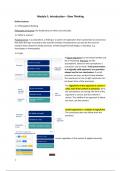Module 1: Introduction – Slow Thinking
Online lectures
1.1 Philosophical thinking
Philosophy of Science: the fundament on which science builds.
1.2 What is science?
Pseudoscience: is a proposition, a finding or a system of explanation that is presented as science but
that lacks the rigor essential to the scientific method. Pseudoscience can also be the result of
research that is based on faulty premises, a flawed experimental design, or bad data. E.g.
horoscopes or homeopathy.
1.3 Logic
A logical argument is a formulised written out
bit of reasoning. Premises are like
assumptions. Based on the assumptions a
conclusion can be made. Truth preservation:
in a logically valid argument, true premises
always lead to true conclusions. If not all
premises are true, we don’t know whether
the conclusion in true (a right conclusion can
be drawn from a false premises).
The logic/form of the argument is correct =
valid, even if the content is nonsense. Here,
the assumptions are wrong: the form of the
argument is correct, but the content is
untrue. The validity of an argument is about
the form, not the content.
Invalid argument is a mistake in logic/form.
The conclusion does not follow from the
premises.
The form of the argument: Modus Pones
Valid argument because the form is correct regardless of the content if applied correctly
1
, The form of the argument: Modus tollens
Valid argument
First premise is false, but the logical form stays the
same = valid argument with false conclusion.
Invalid arguments: the logical form is not valid because the conclusion does not logically follow the
premises.
Book - Chapter 1
Philosophy of science is a discipline of questioning the pretenses of the natural and the social
sciences.
- Natural science is a branch of science that deals with the physical world.
- Social science is the study of human society and social relationships.
o Management studies are a species of social science they do not examine natural
phenomena, but social phenomena, like the way organisations operate or the way
markets functions.
Five features of scientific knowledge
1. Generalizability: it must be applicable to other situations because science wants to explain
and understand phenomena.
2. Controllability: it should be possible to check how research has been performed. Research
has to be transparent and repeatable (in natural sciences)
3. Objectivity: scientific research should strive for independence, is not a matter of taste or
popularity.
2
, 4. Justified methods: science needs to use generally accepted methods in order for knowledge
to be counted as scientific knowledge
5. Parsimony: scientific theories have to be formulated in a simple and basic terms as possible.
o the simpler explanation is not automatically the better one. For example, reality
turns out to be more complex than the original theory could account for.
Misconceptions with regard to the methods in the management sciences:
1. Only empirical research counts as scientific. Empirical research is based on observed and
measured phenomena and derives knowledge from actual experience rather than from
theory or belief, but scientific research is more than the gathering and analysis of empirical
data. Our framework of studying reality is built of theoretical concepts that we need to
analyse (e.g. organisations, management gravity etc.) in order to know what we are talking
about. Empirical data cannot have meaning outside such a conceptual framework. Without
thorough conceptual analysis: the analysis of concepts with which we try to grasp the data
of the reality they represent, there is no thorough scientific research.
2. Scientific research is only descriptive, never prescriptive or normative. Descriptive:
describing something. Prescriptive: tending to say what someone should do or how
something should be done. Normative: making people obey rules (of behaviour). e.g. parties
acting in a free market are bound by certain rules, norms, and preliminaries (behaviour
rules), but on the basis of thorough research we can draw scientifically valid conclusions
about the acts, processes and structures that undermine or enhance the functioning of the
market.
The good reason model of truth: a claim is true, if it is supported by the balance of reasons. A claim
is supported by the balance of reasons if the reasons in favour of the claim decisively outweigh the
reasons against the claim.
Argumentum ad ignorantiam: one claims that something is true because there is no proof for the
opposite of what one claims. ‘’God exists, because there is no proof that God does not exist’’
fallacious (misleading) reasoning.
‘’What is reasonable?’’ is in the philosophy of science understood in three ways. Every scientific
theory works with a set of the following three assumptions:
1. ‘’What is reasonable’’ as a methodological question: about the correct methods of research
and argumentation. The idea of a good reason in science is closely connected to what can be
regarded as valid methods of research.
2. ‘’What is reasonable’’ as an epistemological question: what can we know? It is question
about the reasonableness of one’s theoretical assumptions. As such it is a question about
the rationality of the arguments which are based on that theoretical assumption.
a. E.g. there are powerful theories that help us to understand the patterns of a
recession, but economics cannot make reliable predictions about the occurrence of
recessions in the future.
3. ‘’What is reasonable’’ as an ontological question: about the nature of (social) reality. In
what way do entities and phenomena exist in realty?
a. E.g. money. One might say that social reality (art, fame etc.) is a different reality
than the reality as it is studied in the natural sciences (trees, planets etc.)
Idealism is the position that, ontologically speaking, all natural phenomena are nothing more than
mental representations. Trees and planets are just ideas of us (therefore: idealism), not objects or
3






